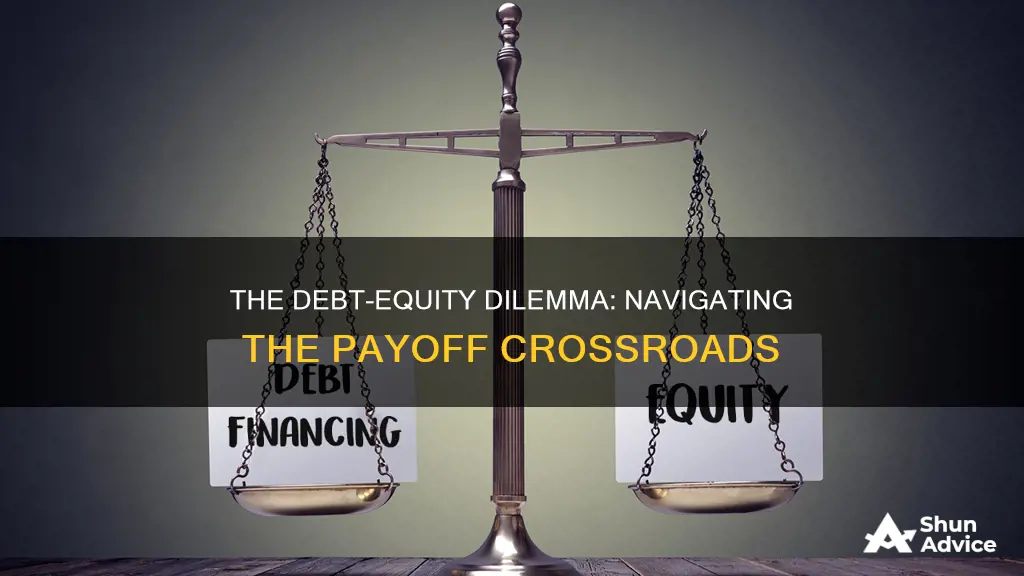
Paying off debt or investing? It's a tough choice, and there are pros and cons to both.
If you're in debt, it can be frustrating to see a chunk of your monthly income going towards repayments. It can also be a mental strain, and you may feel like you're missing out on investing opportunities. However, there are benefits to paying off debt first. The sooner you clear your debt, the less interest you'll pay overall. You'll also have more money in your budget to save and invest, and your credit score will improve, which is important if you want to buy a home or finance a vehicle.
On the other hand, investing early can have its advantages. Compounding interest can help your money grow without any extra effort, and the younger you are when you start investing, the more time your money has to grow. There are also tax benefits to investing, as student loan interest and mortgage loan interest are tax-deductible.
So, which is the best strategy? Well, it depends on your financial situation. If you have high-interest debt, it's often better to focus on clearing that first, as it will cost you more over time. However, if you have low-interest debt, you may be better off investing your money to earn a higher return.
Ideally, you'll be able to do both – pay off your debt and invest for the future. It's important to consider your budget, save an emergency fund, and take advantage of any company retirement plans or matches.
What You'll Learn

The pros of paying off debt first
- The sooner you eliminate debt, the less interest you will have to pay on that debt.
- With no debt payments, you may have more money in your budget to save and invest.
- Reducing debt can improve your credit score, which is important if you want to buy a home or finance a vehicle.
- Being able to escape credit card or loan payments can be a weight off your shoulders. Waiting to pay off debt means carrying that burden longer, and racking up more interest charges.
- Paying off debt can improve your cash flow, allowing you to achieve other financial goals, like buying a house, or improving your overall quality of life.
- Paying off debt can be a smart move if you're losing sleep over your debts.
- If you have multiple debts, paying off the smallest debt first can help you see progress faster and stay motivated to pay off the rest.
- If you have a lot of debt, it can be overwhelming to focus on the largest debt first. By paying off smaller debts first, you can build momentum and stay motivated.
- If you have a debt that is highly overdue, it's best to start with that account as delinquent accounts can have a substantial impact on your credit.
- If you have a credit card that is almost maxed out, reducing its balance can give your credit score a significant boost and improve your chances of securing better rates in the future.
Treasury Bills: Safe and Liquid Investments
You may want to see also

The benefits of investing early
Investing early can have several benefits, and it is a good idea to weigh these against the benefits of paying off debt. Here are some advantages of investing early:
Compounding Interest
Compounding interest is the interest earned on interest. When you invest money and earn a return, that return compounds based on what you've earned and your original principal investment. The younger you are when you start investing, the more time works in your favour. For example, if you invest $6,000 per year from the age of 25, assuming a 7% annual return, by the time you turn 65, your money will have grown to $1.28 million, largely thanks to compounding interest.
Tax Benefits
There can be tax advantages to investing ahead of paying off debt. For instance, student loan interest and mortgage loan interest are often tax-deductible. Deductions reduce your taxable income for the year, meaning less of your money is taken by the IRS.
Higher Returns
The stock market has, over the years, provided higher returns than the interest rates on mortgages. For instance, the S&P 500 has returned an average of 10% to 11% annually since 1926. So, if you have a low-interest debt, you could potentially earn more over the long run by investing in an ETF that tracks the growth of the stock market.
Employer Match
Many employers match 401(k) contributions up to a certain percentage. This is free money to invest with, and it is part of your overall compensation package. Not taking it is like giving up part of your salary.
Peace of Mind
While paying off debt can provide peace of mind, investing early can also reduce stress in the long term. Investing early means you are building wealth over time, which can provide financial security and peace of mind in the future.
Investments: Top Ten Picks
You may want to see also

The tax benefits of investing
Investing is a great way to grow your wealth over time, and one of the key advantages of investing is the potential to reduce your tax burden. Here are some tax benefits to consider:
- Tax-efficient accounts: Choosing the right type of investment account can help minimise taxes. Taxable accounts, such as brokerage accounts, are suitable for investments that lose less of their returns to taxes. On the other hand, tax-advantaged accounts like IRAs, 401(k)s, and Roth IRAs offer tax benefits that can boost your investment growth.
- Tax-deferred growth: Contributions to traditional IRAs and 401(k)s are made with pre-tax dollars, lowering your taxable income for the year. While you'll pay taxes on distributions in retirement, this provides an immediate tax break and allows your investments to grow tax-free in the meantime.
- Tax-free withdrawals: With a Roth IRA or Roth 401(k), you contribute with after-tax dollars, but the account grows tax-free, and qualified withdrawals in retirement are also tax-free. This can be especially beneficial if you expect to be in a higher tax bracket when you retire.
- Tax-efficient investments: Municipal bonds, Treasury bonds, and certain types of mutual funds and exchange-traded funds (ETFs) are more tax-efficient because they trigger fewer capital gains taxes. Placing these investments in taxable accounts can further reduce your tax liability.
- Long-term capital gains: Holding investments for more than a year generally results in lower capital gains taxes when you sell. This can be a strategic way to reduce your overall tax burden, especially if you can delay selling until you've passed the one-year mark.
- Tax loss harvesting: If you have investments that have lost value, selling them can offset the capital gains taxes on your profitable investments. This strategy, known as tax loss harvesting, can help reduce your overall tax bill but requires careful navigation to avoid "wash sales".
- Charitable giving: Donating appreciated securities, real estate, or business interests to charity can provide a tax deduction and help you avoid capital gains taxes on those investments. Additionally, gifting highly appreciated securities offers a larger donation than liquidating the stock and paying capital gains tax.
- Estate planning: The way you structure your investments can have estate planning benefits. For example, leaving stocks in taxable accounts to your heirs provides a step-up in cost basis, calculated based on the market value at the time of death. Roth IRAs are also an excellent bequest, as distributions are tax-free for beneficiaries.
By combining tax-efficient accounts, tax-advantaged growth, and strategic investment choices, you can maximise your after-tax returns and keep more of your money working for you. Remember to consult with a qualified financial or tax advisor to determine the best strategies for your specific situation.
Moderna: Invest Now or Never?
You may want to see also

How to do both
Assess your budget
Before deciding how to allocate your money, it's important to understand your financial situation. Track your income and expenses to see how much money is coming in and going out. This will help you identify any areas where you can cut back on spending and free up more money to put towards your financial goals.
Create an emergency fund
It is recommended to have an emergency fund in place before focusing solely on paying off debt or investing. This will help you cover unexpected expenses, such as car repairs or medical bills, without having to rack up more debt. Aim to save enough to cover at least three to six months' worth of living expenses.
Prioritize high-interest debt
High-interest credit card debt can be particularly costly, with average interest rates above 20%. Focus on paying off these debts first to save money on interest and free up more cash flow for investing.
Take advantage of employer matches
If your employer offers matching contributions to a retirement plan, such as a 401(k), be sure to contribute enough to qualify for the full match. This is essentially free money that can help boost your retirement savings.
Refinance or consolidate debt
Consider refinancing your student loans or mortgage to lock in a lower interest rate, which can reduce your monthly payments and free up more money for investing. You can also look into debt consolidation loans or balance transfer credit cards with a 0% introductory APR to help simplify your debt repayment and reduce interest charges.
Find ways to increase your income
Increasing your income can help you accelerate your progress towards both debt repayment and investing. Consider taking on a side hustle or picking up extra hours at your current job to bring in more money that can be allocated towards your financial goals.
Automate your investments
Automating your investments can help ensure that you stay on track towards your investment goals. Set up automatic transfers from your paycheck or bank account to your investment accounts so that you don't even have to think about it.
Stay disciplined and consistent
Finally, remember that achieving your financial goals requires discipline and consistency. Stick to your budget, continue making progress on paying off debt, and regularly contribute to your investments, even if it's only a small amount. Over time, your efforts will compound and you'll be well on your way to financial success.
Russia: Invest or Avoid?
You may want to see also

Why you shouldn't stop investing
There are several reasons why you shouldn't stop investing, even if you have debts to pay off. Firstly, investing is a way to grow your wealth over time. By investing, you can take advantage of compound interest, which allows your interest and gains to stack on top of each other, increasing your returns over the long term.
Secondly, investing helps you build long-term wealth and reach major financial goals, such as retirement, buying a home, or saving for college. Starting early and investing regularly can lead to a large nest egg down the line.
Thirdly, investing allows you to take advantage of market fluctuations. While the market will have its ups and downs, staying invested through these periods of volatility can lead to larger returns in the long run. Timing the market is nearly impossible, so it's better to focus on time in the market.
Additionally, investing can be done alongside paying off debt. It's important to budget and ensure you can cover basic expenses, but investing even a small amount of money regularly can be beneficial. This can be done by setting up automatic investments from your checking account into your chosen investment vehicle, such as an index fund or ETF.
Finally, investing can provide diversification to your financial portfolio. By investing in a variety of assets, such as stocks, bonds, or real estate, you reduce the risk of putting all your eggs in one basket. This diversification can help protect your wealth and potentially increase your returns.
In summary, while it's important to manage your debts, stopping investing altogether can hinder your long-term wealth accumulation. A balanced approach that includes both debt repayment and investing can help you achieve your financial goals and maximize your returns.
Investing in People: A Risky Business
You may want to see also
Frequently asked questions
It depends on the type of investment and the type of debt. If you have high-interest debt, such as credit card debt, it is generally recommended to pay that off first before investing. However, if you have non-retirement investments, it is advisable to cash those out to pay off your debt.
Paying off debt first can improve your credit score, reduce financial stress, and free up more money in your budget to save and invest.
Investing early allows you to take advantage of compounding interest, which can help your money grow faster over time. Additionally, investing early can help you build wealth and meet your long-term financial goals.







